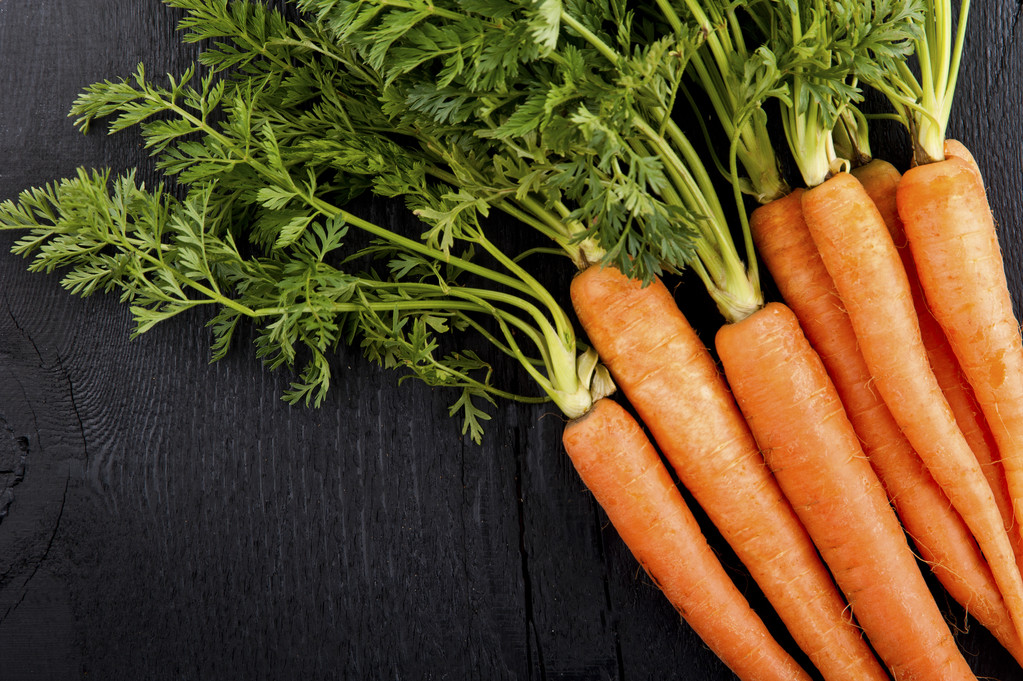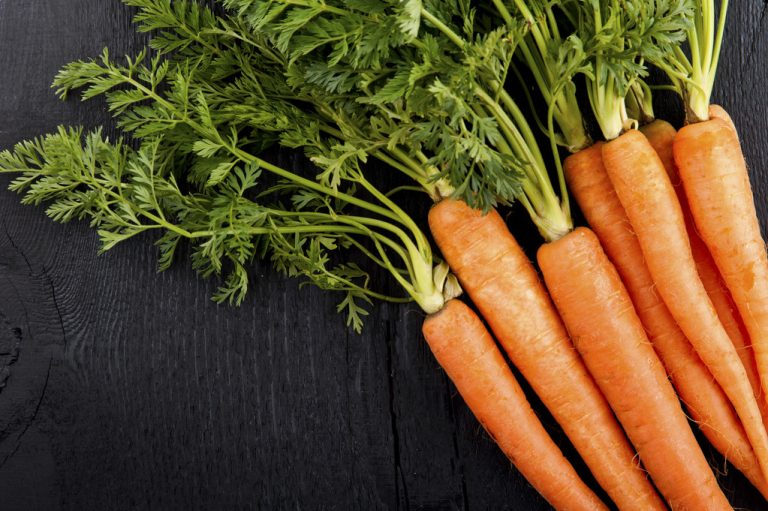Thanks to their nutritional values, carrots are considered extremely healthy: they are rich in vitamins and minerals, but low in calories. The yellow beets not only provide your body with beta-carotene, but also with many other nutrients.
Carrots are versatile in the kitchen: They are popular as raw vegetables and salads, cooked as an accompaniment to many dishes and pureed to make delicious soups. They make a cake particularly juicy. Even more varied than the preparation options offered by carrots are their nutritional values. Carrots aren’t just “good for the eyes,” as you probably learned from your parents – they do a lot more for your health.

The nutritional values of the carrot include many vitamins
Carrots are particularly rich in vitamins. Above all, they are known to contain larger amounts of the provitamin beta-carotene. The body converts beta-carotene into vitamin A, which plays an important role in seeing things like light and dark. Carrots are also a good source of numerous other vitamins. According to the Apotheken-Umschau, 100 grams provide the following nutritional values on average:
Folic Acid – 15 mcg (micrograms)
Beta carotene – 9800 mcg
Vitamin B1 – 0.07 mg
Vitamin B2 – 0.05 mg
Vitamin B6 – 0.27 mg
Vitamin E – 0.5 mg
Vitamin C – 7 mg
Because they contain vitamin C, carrots can help boost the immune system against pathogens. This is confirmed, for example, by a study on the health effects of carrot juice. Vitamin A, on the other hand, not only has a positive effect on vision, but is also good for the skin. The same applies to vitamin E. Carrots are said to ensure a healthy complexion, improve skin impurities and prevent skin aging.
The nutritional values of carrots also include antioxidants
With vitamins C and E, carrot nutritional values also include antioxidants. Studies have shown, for example, that carrot juice increases antioxidant levels and can therefore play a role in preventing cancer. Antioxidants protect against free radicals. These are substances that damage the genetic material in the cells if they occur in too large numbers and can thus possibly lead to cancer. Beta carotene also has an antioxidant effect.
Carrots are healthy
Whether raw, cooked or as juice: carrots not only provide vitamins, but also a wide range of different ingredients. They are therefore particularly healthy. Their nutritional values also cover a high proportion of various minerals. According to Apotheken-Umschau, 100 grams contain on average:
Potassium – 330 mg
Sodium – 60 mg
Calcium – 35 mg
phosphate – 35 mg
Magnesium – 15 mg
Iron – 0.4 mg
Zinc – 0.3 mg
In addition, carrots are a high-fiber vegetable: raw, they contain 3.6 grams of fiber per 100 grams. Fiber is good for digestion and blood pressure, among other things.
Carrots have good nutritional values but are low in calories
Basically, carrots are considered a low-calorie vegetable. However, the exact values differ depending on how you prepare them – sometimes even significantly.
According to the nutritional table, 100 grams of fresh carrots have an average of 25 calories.
Carrot juice is also low in calories: With 100 milliliters you consume an average of 22 calories.
The situation is different with dried carrots. As is often the case with dry products, the calorific value here skyrockets to 194 calories per 100 grams.
Do cooked carrots have different nutritional values than raw?
In the case of canned carrots, on the other hand, the calorific value even drops to 14 calories per 100 grams. In principle, cooked carrots have fewer calories than raw ones. Nevertheless, they do not necessarily make you slimmer: For one thing, we often prepare them with oil or butter, which of course increases the calorie count of the entire meal.
On the other hand, the so-called glycemic index (GI) is higher in cooked carrots than in raw vegetables. The glycemic index measures the effect of carbohydrate-containing foods on the blood sugar level: the more sugar they bring into the blood, the higher the corresponding value. Raw carrots have a GI of just 16, while cooked carrots have a GI of 49. While that’s still considered low, the difference is still noticeable.
However, the validity of the glycemic index is controversial. For example, the nutritionist Stefan Weigt points out that the measured values always refer to 50 grams of carbohydrates. Because carrots basically contain hardly any carbohydrates, you would have to eat a whopping 800 grams of them to actually get a GI of 49. The measurement results are also often inaccurate and can vary greatly from person to person.
Does Fat Boost Carrot’s Healthy Nutritional Values?
It is often said that carrots can only develop their full health benefits together with oil or butter. It is true that beta-carotene is fat-soluble – which means that the body actually absorbs more of it in combination with fats.
However, a recent study has shown that how thoroughly you chop the vegetables has an even greater impact on the nutritional values. In the experiment, sliced raw carrots released only three percent of their total beta-carotene into the body. Pureed carrots, on the other hand, provided 21 percent and cooked puree (e.g. in the form of soup) as much as 27 percent. However, added oil could increase these nutritional values.

